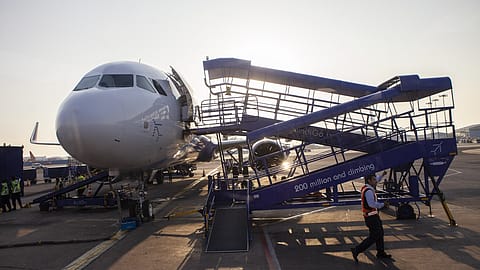Repeated snags: DGCA asks airlines to find solutions by July 28
DGCA says there have been reports of "increased engineering-related occurrences" in airlines; directives come after Scindia meets top ministry and DGCA officials

Amid a spate of mid-air incidents involving domestic airlines, the aviation regulator DGCA (directorate general of civil aviation) has taken a serious note while conducting several spot checks. It has issued a series of instructions to be followed to ensure smooth operations.
The aviation regulator says there have been reports of "increased engineering-related occurrences" in scheduled airlines in recent times. In order to ensure that airlines are adhering to the laid down standards, DGCA has conducted several spot checks in the recent past, it says.
After conducting these checks, the DGCA found that airlines did "improper identification of the cause of a reported defect". It also found an increasing trend of MEL (minimum equipment list) releases and non-availability of required certifying staff to cater to “multiple scheduled arrivals or departures” in a short interval.
According to the DGCA, airlines were also found to be resorting to frequent “one-off authorisation to category A certifying” staff at transit stations, which is not in line with existing regulatory provisions.
"Keeping the above in view, it has been decided that all aircraft at base and transit stations shall be released by certifying staff holding AME category B1/B2 licence with appropriate authorisation by their organisation," says the DGCA.
Recommended Stories
Airlines have been advised to position certifying staff at all base and transit stations, including the availability of required tools and equipment. "Alternatively, you may opt for sending the certifying staff on flight duties," says DGCA. The airlines have been directed to ensure compliance by July 28, 2022.
The directives came after aviation minister Jyotiraditya Scindia held a meeting with top ministry and DGCA officials. The minister clearly outlined there should be no compromise when it comes to safety.
(INR CR)
Airlines continue to come under the DGCA scanner for frequent incidents, which have pointed towards issues with safety and maintenance. On Sunday last week, two incidents involving an IndiGo plane and Air India Express plane came to light.
IndiGo's Sharjah-Hyderabad bound flight 6E-1406 operating Airbus A320 had to be diverted to Karachi after it developed an engine snag. India's largest airline had to send an alternate aircraft to Pakistan to ferry passengers to Hyderabad. The DGCA launched an inquiry into the incident. Before this, on July 14, IndiGo's Delhi-Vadodara flight was diverted to Jaipur as the crew observed vibrations in the plane's engines.
The second incident involved Air India's budget carrier Air India Express when a bird was found alive inside the cockpit in a Bahrain to Kochi flight. It was huddled inside the glove compartment and was released safely as the aircraft landed in Kochi. A day before on Saturday last week, Air India Express's Calicut to Dubai flight had to be diverted as the crew observed a burning smell in the cabin.
The aviation regulator is probing these incidents. SpiceJet, which operates Boeing 737 Max planes, has also reported many such incidents in the recent past. On July 5, a SpiceJet Boeing 737 aircraft carrying passengers from Delhi to Dubai had to be landed in Karachi, Pakistan, after developing a technical malfunction. The company had to send a replacement aircraft to Karachi, which took the passengers to Dubai.
On July 2, SpiceJet's Delhi-Jabalpur flight had to be returned as crew members observed smoke in the cabin mid-air due to oil leakage in one of its engines. In a similar incident, a SpiceJet Boeing 737-800, with about 200 people on board, had to be returned to Patna after take-off on June 20 as sparks were observed in one of its engines following a bird hit it during the take-off. SpiceJet operates a fleet of Boeing and Q-400s aircraft, including the new-generation Boeing 737-700s, 737-800s and 737-900ERs.